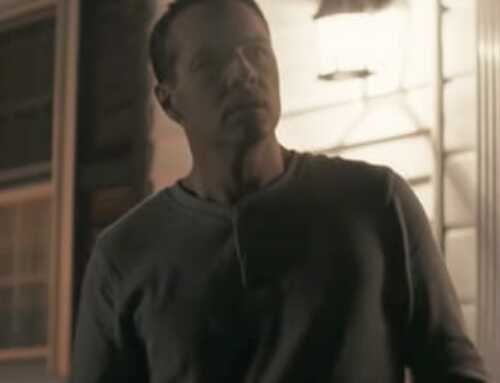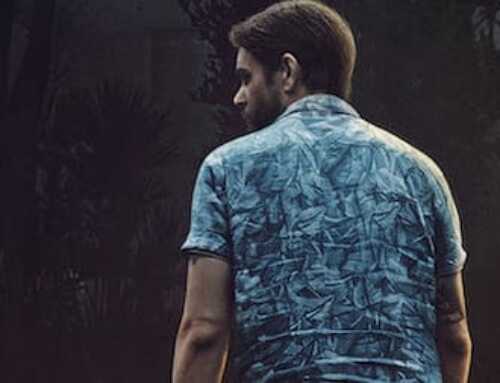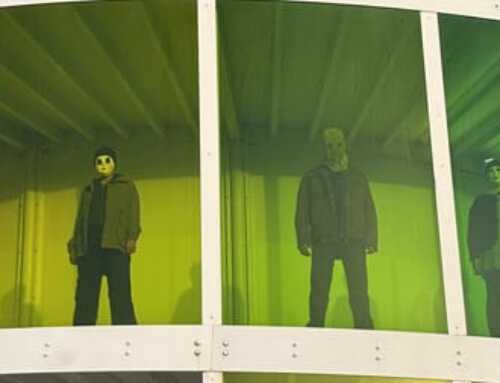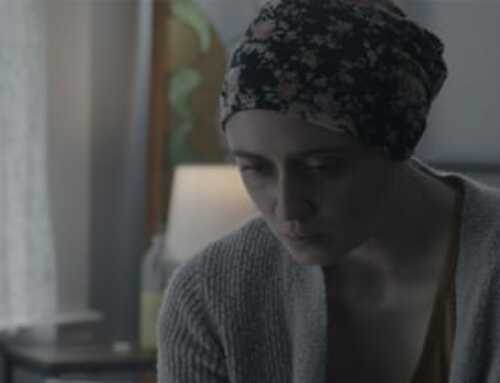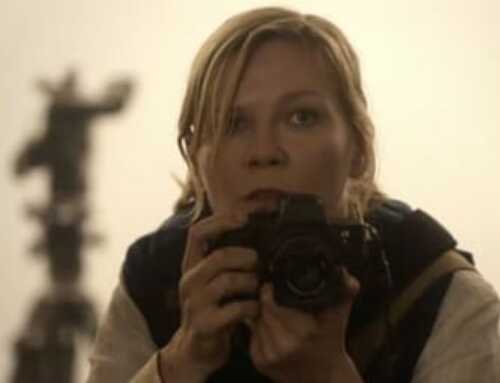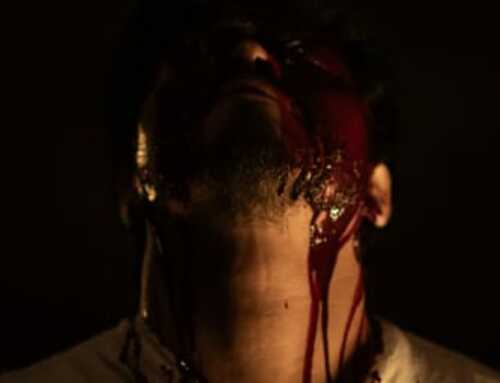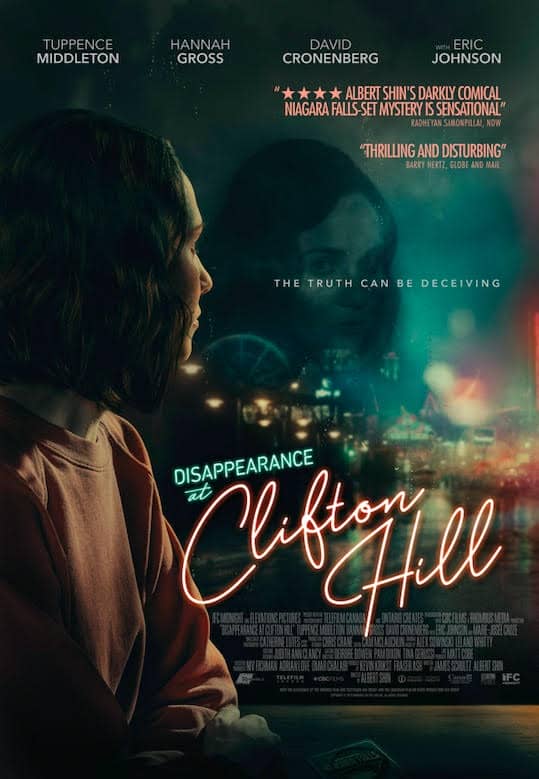 Albert Shin is a relatively young filmmaker. Yet his resume is surprisingly varied and his range of skills; producer, writer, director, actor, and editor is equally impressive. The Toronto-trained writer-director took the time to chat with us about his new film Disappearance at Clifton Hill on its release today in theaters and digital.
Albert Shin is a relatively young filmmaker. Yet his resume is surprisingly varied and his range of skills; producer, writer, director, actor, and editor is equally impressive. The Toronto-trained writer-director took the time to chat with us about his new film Disappearance at Clifton Hill on its release today in theaters and digital.
Part biographical reflections, part fiction, and total homage to a former home of Shin, Disappearance at Clifton Hill follows a young woman’s return home and entanglement in a years-old mystery. Rich with atmosphere Shin pulls from multiple genres, creating a fascinating watch.
HorrorBuzz: I found it to be a very accomplished work. You co-wrote it. Correct?
Albert Shin: Yes.
HB: How did this story develop?
AS: My parents are Korean, they immigrated to Canada. They settled in Niagara Falls and bought a motel in the shadow of Clifton Hill which is sort of the tourist promenade with all the funhouses and hall of mirrors and all that kind of stuff. In my youth, my dad was a very avid fisher and he would fish along the Niagara River. And, very much like in the film, I was young, and I wandered off during one of these fishing trips and ended up in this secluded forested area. I saw what later I would describe as a kidnapping. I was 5 or 6 years old, so, you know, I was very young and probably not exactly sure what I was seeing. I remember that what I was seeing felt very funny, and like, visceral. As time went on, I got older and I would recount this story and it would get bigger and morphed into make-believe. By the time I got to high school, it was just a cool story to tell friends and the story had kind of mutated to match that. It got me to thinking about the line between memory and truth and how that is quite malleable. How they can sort of machinate and turn into something else. So, as I was writing the film I would wonder, did I really see anything or did I just make it all up? That was kind of the basis for the story. Our lead character Abby, she’s a pathological liar and somebody that sort of plays loose with the truth.
HB: I found that interesting because you make sure we are aware she is a very unreliable narrator all the way up to the very end. Why the decision to do that, especially in a mystery?
AS: It was a couple of things. First of all, detective films, noir, gumshoe mysteries, they are filmed in this type of arena where they reach tropes that are very identifiable. Some of those tropes I wanted to subvert somehow and let the some of the thematic elements of the film manifest in the character, the story and how the film was plotted. I was thinking of the relativity of truth, especially in this day and age where facts are very subjective. You can show people data and they interpret it certain ways. So truth has become something to argue about. Everyone sort of has their own version of what is true.
Instead of making it a ticking time bomb where if she doesn’t solve a mystery in time another kid disappears or instead of having a moment in the final act where the hero is tied up and the bad guy is explaining everything that happened, I wanted to make it more cerebral but still engrossing, interesting and satisfying. So my goal was to twist the thematic elements of the film and turn it into story elements.
HB: You definitely did that. I loved watching the scenes of her investigating, peeling away at what was happening.
AS: There is a sort of pleasure of watching those detective’y sort of things, I did want to lean into that but I wanted it to be fun. But we were definitely in a nourish universe but we were also trying to be, you know, weird and funny and strange and all that stuff as well.
HB: You filled the movie with all of these absolutely bizarre characters and you also portray Niagara Falls as this sort of low-rent Atlantic City. You obviously spent a lot of time there, you are up there.
AS: I spent a lot of time there when I was very young, but then my family moved away. I was always pulled to that place though, even when I was in high school. We had moved to Toronto so it was always about an hour and a half drive away from where I lived. It wasn’t inaccessible, I could always go there. Then when I was writing the film I pretty much lived there, just soaking it all in. I was trying to get into why this town was interesting. It is a strange town. I thought, “How do I mythologize this town? How do I show Niagara Falls as a character and share everything in that world?” Everybody knows there’s a Niagara Falls, but they forget there is a town that’s attached to it that has never really been utilized in the cinematic world. For me as an indie filmmaker, I don’t have you know, alien invasions or things like that, so I thought, “How do I make this world a cinematic world?” That was part of the allure.
HB: If you could put a word on what it is that draws you to that town, what would it be?
AS: For me personally it’s such a unique energy because it’s a unique town. It’s a place with funhouses and haunted houses and Ferris wheels and all that kind of stuff and it’s very much a man-made contrivance. Almost a temple of man-made contrivance. Then right up next to it is one of the most incredible World wonders that we have on this earth. That sort of tension between these two things is interesting. It’s a border town, a tourist town, it’s also a very transient town with the casinos and that sort of thing. It has all these façades. Then you use that in a noir film, you know, I thought the location could project all of the thematic elements of the film.
HB: It definitely did that with all of the dualities and, you know, it felt very Blade Runner with the score and the wet asphalt.
AS: Yeah that’s the thing. We shot it in Niagara Falls this is very much a Niagara Falls film, we didn’t shoot any of it on a sound stage or in some other town. We went there and shot it and just tried to control the frame and how we shot this world within the actual world that existed to make something that felt cinematic. So Blade Runner is a great example, I wasn’t thinking of that when I made the film but it’s a very dark, noir’y thing with all the neon.
HB: Your huge get with Cronenberg. How? How did that happen?
AS: The short story is that it was the hardest part to cast but Cronenberg turned out to be the easiest person to cast in the movie. I need something very specific for that role. I needed an older actor, you know, about 70 or 80. That narrows the pool a bit, but then I wanted someone with a filled-in persona. So you add that onto of it as well and it was really hard to find the right actor to play this character, Walter.
We were a week out from shooting the film and we still hadn’t cast the part. One of the producers of the film, Niv Fichman, personally knew David a little bit so he was like, “What about David Cronenberg?” Obviously it doesn’t take a huge leap to see how that could work. The character is a conspiracy theorist, with a UFO Diner and records podcasts in the basement. But at the same time, you know, Cronenberg, he didn’t know who I was and I thought, “He’s probably busy because he’s David Cronenberg.” I wasn’t holding my breath but we were desperate and we sent him the script. He read the script within hours. Within days we were sitting in his kitchen, talking about the film and the character, then a few days after that we had him coming out of the Niagara River as a scuba diver. All of that happened within a week and that was after months of looking.
HB: It feels like it was written for him.
AS: Yeah, now you watch it and you think, “Who else could have played that?” That’s why everybody asks if I wrote the part for Cronenberg. I am like, I am a young filmmaker. I am not arrogant enough to think I could write a part for David Cronenberg and have him look at it. It’s just one of those things. That’s just how it is, making an indie film. You are up against a lot of things. You are fighting everything, budget, money, time. For these movies to be made, some things just have to break your way and casting David Cronenberg was definetly one of those things.
HB: It brings some gravitas to the film but he’s really good in it.
AS: Yeah he was really big about it. People were asking me, “Oh yeah you have David Cronenberg watching you direct, you gotta be pretty self-conscious bout that.” But he was there to be a cog in the machine. His take was, “I’m just an actor.” He had these big monologues that he was busy memorizing. He was really gracious. He understood it was a role to have fun with. But yes, he brought something to it that I was looking for. You war watching it and, you know, it’s Cronenberg playing a character but for cinephiles, he brings a history with him. That was all built-in for the actor that I needed for the film. It really was written for him, I just didn’t know it at the time.
HB: Being an indie filmmaker what advice would you give to indie filmmakers out there who are trying to get there stuff out there to be seen?
AS: Well, the thing that I always tell people is that whatever space you want to work in, genre, comedy, whatever it is, I think when it’s your first or second feature and you are trying to break in and you are trying to make it your career, your true vocation, it really starts with having something to say. But that isn’t all, you have to know how to say it. It’s not about the scale or the means. Once you have that, it really is about finding like-minded collaborators. Making movies is not a solo mission. It’s kind of a “Takes a village” endeavor. Once you have that, you have collaborators that you can trust and are on the same wavelength, then after that take some risks and have fun.
Disappearance at Clifton Hill Arrives today in theaters and On Demand.


